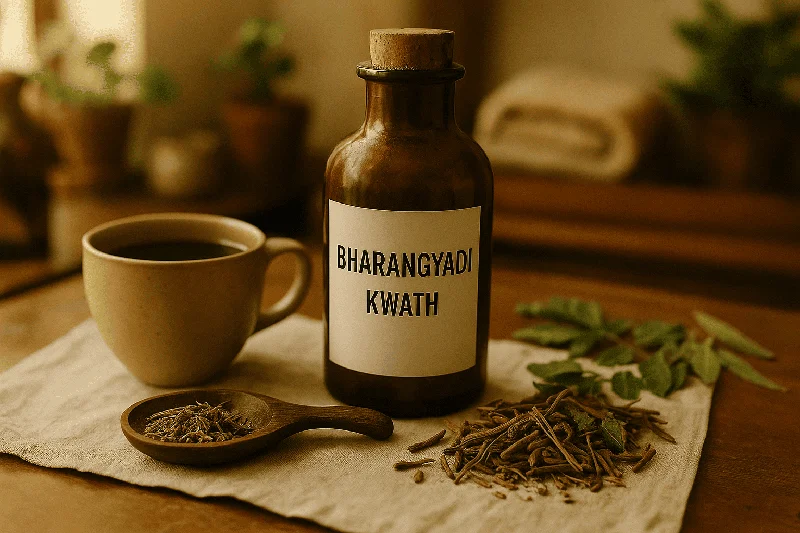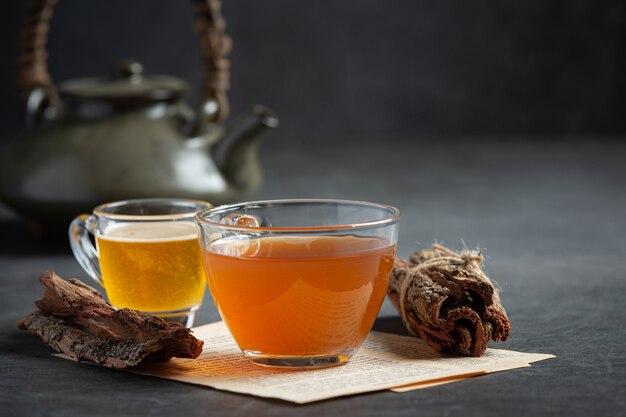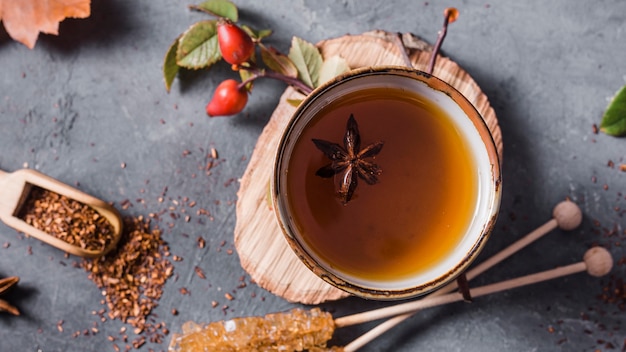Bharangyadi Kwath – Natural Ayurvedic Detox & Healing Decoction

Don't wait or self medicate. Start chat with Doctor NOW
Introduction to Bharangyadi Kwath
Bharangyadi Kwath is a potent Ayurvedic decoction crafted from a unique blend of bitter herbs. Revered for its detoxifying and healing properties, this formulation is designed to stimulate digestion, eliminate toxins (ama), and restore the natural balance of the doshas. By incorporating Bharangyadi Kwath into your wellness routine, you embrace ancient Ayurvedic wisdom to rejuvenate your system and promote overall health.
Historical Roots & Ayurvedic Significance
In Ayurveda, bitter formulations have long been valued for their ability to purify the body and enhance metabolic fire (Agni). Bharangyadi Kwath finds its roots in classical Ayurvedic texts that recommend bitter decoctions for detoxification and dosha balancing. This time-tested remedy has been used for centuries to address internal imbalances, promote healthy digestion, and support systemic rejuvenation.
Key Components & Therapeutic Benefits
Herbal Composition & Synergy
Bharangyadi Kwath is formulated with a synergistic blend of herbs, where each component plays a crucial role in promoting detoxification and balance:
- Bharangi Extract: The primary ingredient known for its potent detoxifying and digestive properties.
- Complementary Bitter Herbs: These herbs work together to stimulate digestive enzymes, reduce inflammation, and aid in the elimination of toxins.
- Natural Bioactive Compounds: Enhance immune function and support cellular regeneration for overall vitality.
Therapeutic Benefits
- Detoxification: Clears accumulated toxins (ama) and purifies the blood, promoting internal healing.
- Digestive Stimulation: Boosts Agni (digestive fire) to improve nutrient absorption and metabolic function.
- Dosha Balancing: Helps harmonize imbalances, particularly in Pitta and Kapha, supporting overall systemic health.
- Anti-Inflammatory & Antioxidant Effects: Reduces inflammation and protects cells from oxidative stress, contributing to long-term well-being.
How Bharangyadi Kwath Works: The Science Behind the Decoction
The distinctive bitter taste of Bharangyadi Kwath acts as a natural stimulant for the digestive system. It encourages the secretion of digestive enzymes and bile, facilitating the breakdown of toxins and their efficient elimination from the body. Moreover, its anti-inflammatory and antioxidant properties help soothe internal inflammation, restore cellular health, and maintain a balanced internal environment.
Recommended Protocol & Usage Guidelines for Bharangyadi Kwath
For optimal benefits, consider the following guidelines when using Bharangyadi Kwath:
- Initial Consultation: Seek personalized advice from a qualified Ayurvedic practitioner to assess your constitution (Prakriti) and determine the ideal dosage.
- Dosage & Administration: Typically, take 15-30 ml of Bharangyadi Kwath once or twice daily on an empty stomach. It may be consumed directly or diluted with warm water.
- Complementary Practices: Enhance its effects with a light, detoxifying diet and other Ayurvedic therapies such as Panchakarma.
- Monitoring: Regular follow-ups help ensure the decoction is effectively balancing your doshas and promoting wellness.
Potential Side Effects & Precautions
While Bharangyadi Kwath is generally well-tolerated, some precautions include:
- Digestive Discomfort: Mild gastrointestinal disturbances or increased bowel movements may occur initially as the body detoxifies.
- Allergic Reactions: Rare sensitivities can develop; a patch test or starting with a lower dose is advisable.
- Special Populations: Pregnant or nursing women and individuals with chronic conditions should consult an Ayurvedic expert before use.
Frequently Asked Questions About Bharangyadi Kwath
What is Bharangyadi Kwath used for?
It is primarily used to detoxify the body, stimulate digestion, and balance the doshas, promoting overall internal cleansing and vitality.
How does Bharangyadi Kwath work?
Its bitter components stimulate digestive fire (Agni) and enhance the elimination of toxins, reducing inflammation and restoring systemic balance.
Who can benefit from Bharangyadi Kwath?
Individuals experiencing digestive sluggishness, toxin accumulation, or doshic imbalances may find this decoction particularly beneficial.
What is the recommended dosage?
Typically, 15-30 ml once or twice daily on an empty stomach, though the exact dosage should be personalized by an Ayurvedic practitioner.
Can Bharangyadi Kwath be combined with other therapies?
Yes, it is often integrated with Panchakarma and other detoxification practices to amplify its benefits.
Are there any side effects?
Some users might experience mild digestive discomfort initially; however, side effects are generally minimal with proper usage.
Where can I purchase authentic Bharangyadi Kwath?
Always source it from reputable Ayurvedic pharmacies or certified practitioners to ensure quality and authenticity.
Conclusion & Expert Insights
Bharangyadi Kwath embodies the Ayurvedic principle of using bitter herbs to detoxify and rejuvenate the body. Its comprehensive action supports digestive health, reduces internal inflammation, and restores dosha balance, paving the way for enhanced vitality and well-being. By incorporating Bharangyadi Kwath into your daily regimen under professional guidance, you can unlock the ancient secrets to a healthier, more balanced life.
References & Further Reading
- Traditional Ayurvedic texts on detoxification and bitter formulations.
- Sharma, P.V. (1995). Ayurvedic Healing: A Comprehensive Guide.
- Lad, V. (2002). Ayurveda: The Science of Self-Healing.
- Consultations with certified Ayurvedic practitioners and contemporary research on detoxification therapies.
Got any more questions?
Ask Ayurvedic doctor a question and get a consultation online on the problem of your concern in a free or paid mode.
More than 2,000 experienced doctors work and wait for your questions on our site and help users to solve their health problems every day.



